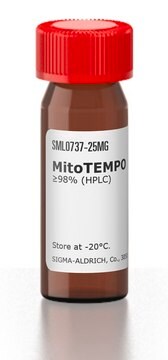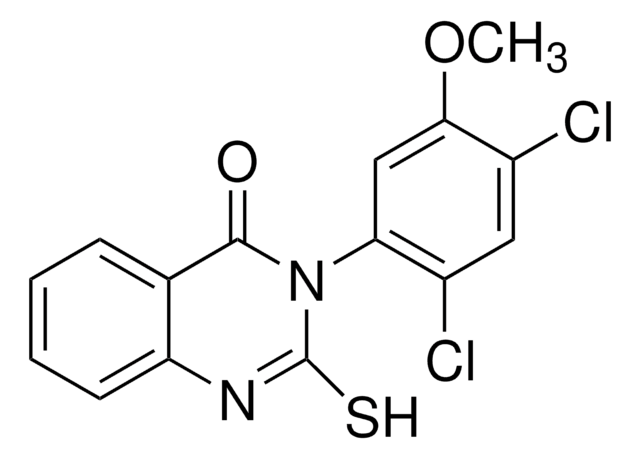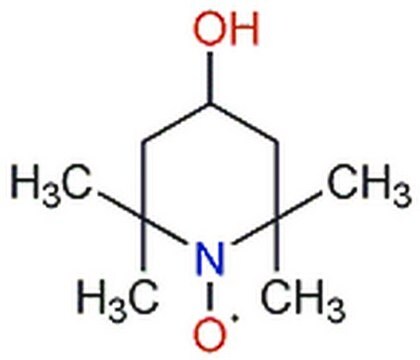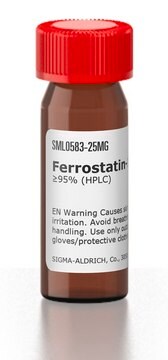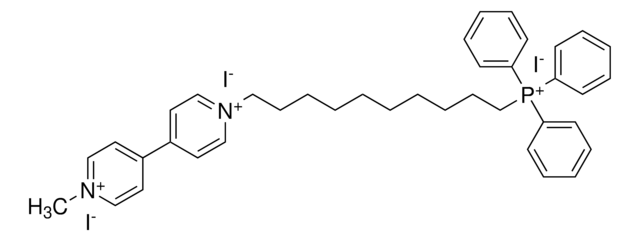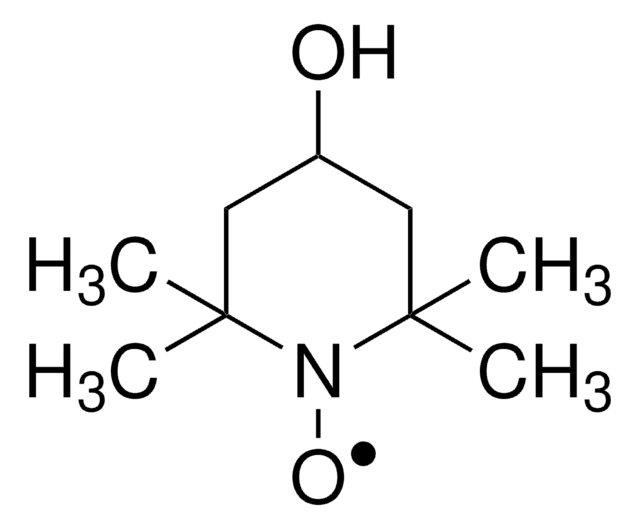SML0629
Mitochondrial Fusion Promoter M1
≥95% (HPLC)
Sinônimo(s):
(E)-4-Chloro-2-(1-(2-(2,4,6-trichlorophenyl)hydrazono)ethyl)phenol, 1-(5-Chloro-2-hydroxyphenyl)-ethanone 2-(2,4,6-trichlorophenyl)hydrazone
Faça loginpara ver os preços organizacionais e de contrato
About This Item
Fórmula empírica (Notação de Hill):
C14H10Cl4N2O
Número CAS:
Peso molecular:
364.05
Código UNSPSC:
12352200
NACRES:
NA.77
Produtos recomendados
Nível de qualidade
Ensaio
≥95% (HPLC)
Formulário
powder
cor
white to beige
solubilidade
DMSO: 10 mg/mL, clear
temperatura de armazenamento
2-8°C
Aplicação
Mitochondrial Fusion Promoter M1 has been used as a fusion promoter:
- to study its effects on peroxisome proliferator-activated receptor-γ coactivator (PGC)-1α expression in breast cancer cells
- to study the link between nucleoside diphosphate kinase 3 (NME3)-regulated mitochondrial fluctuations and stability of genome in NME3 knockdown cells
- to study its effects on mitochondrial fusion in neuronal cells
Ações bioquímicas/fisiológicas
Mitochondrial Fusion Promoter M1 is a cell permeable hydrazone that enhances mitochondrial fusion. M1 protects cells from mitochondrial fragmentation associated cell death. Mitochondrial Fusion Promoter M1 does not interfere with endoplasmic reticula (ER) and lysosomes morphology.
Código de classe de armazenamento
11 - Combustible Solids
Classe de risco de água (WGK)
WGK 3
Ponto de fulgor (°F)
Not applicable
Ponto de fulgor (°C)
Not applicable
Escolha uma das versões mais recentes:
Certificados de análise (COA)
Lot/Batch Number
Não está vendo a versão correta?
Se precisar de uma versão específica, você pode procurar um certificado específico pelo número do lote ou da remessa.
Já possui este produto?
Encontre a documentação dos produtos que você adquiriu recentemente na biblioteca de documentos.
Kehan Ren et al.
Experimental cell research, 400(1), 112493-112493 (2021-01-25)
Most cancer deaths are due to the colonization of tumor cells in distant organs. More evidence indicates that overexpression of RACGAP1 plays a critical role in cancer metastasis. However, the underlying mechanism still remains poorly understood. Here we found that
Minjie Shen et al.
Nature neuroscience, 22(3), 386-400 (2019-02-12)
Fragile X syndrome results from a loss of the RNA-binding protein fragile X mental retardation protein (FMRP). How FMRP regulates neuronal development and function remains unclear. Here we show that FMRP-deficient immature neurons exhibit impaired dendritic maturation, altered expression of
Chih-Wei Chen et al.
International journal of molecular sciences, 21(14) (2020-07-28)
NME3 is a member of the nucleoside diphosphate kinase (NDPK) family that binds to the mitochondrial outer membrane to stimulate mitochondrial fusion. In this study, we showed that NME3 knockdown delayed DNA repair without reducing the cellular levels of nucleotide
Ryohei Iwata et al.
Science (New York, N.Y.), 369(6505), 858-862 (2020-08-15)
The conversion of neural stem cells into neurons is associated with the remodeling of organelles, but whether and how this is causally linked to fate change is poorly understood. We examined and manipulated mitochondrial dynamics during mouse and human cortical
Nossa equipe de cientistas tem experiência em todas as áreas de pesquisa, incluindo Life Sciences, ciência de materiais, síntese química, cromatografia, química analítica e muitas outras.
Entre em contato com a assistência técnica